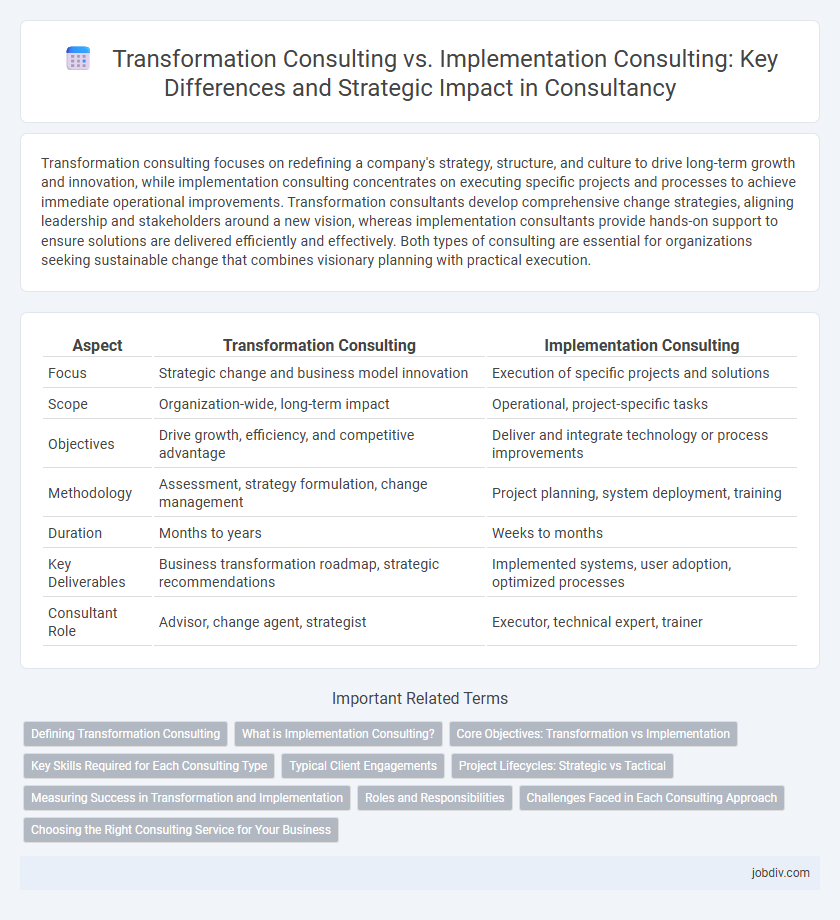Transformation consulting focuses on redefining a company's strategy, structure, and culture to drive long-term growth and innovation, while implementation consulting concentrates on executing specific projects and processes to achieve immediate operational improvements. Transformation consultants develop comprehensive change strategies, aligning leadership and stakeholders around a new vision, whereas implementation consultants provide hands-on support to ensure solutions are delivered efficiently and effectively. Both types of consulting are essential for organizations seeking sustainable change that combines visionary planning with practical execution.
Table of Comparison
| Aspect | Transformation Consulting | Implementation Consulting |
|---|---|---|
| Focus | Strategic change and business model innovation | Execution of specific projects and solutions |
| Scope | Organization-wide, long-term impact | Operational, project-specific tasks |
| Objectives | Drive growth, efficiency, and competitive advantage | Deliver and integrate technology or process improvements |
| Methodology | Assessment, strategy formulation, change management | Project planning, system deployment, training |
| Duration | Months to years | Weeks to months |
| Key Deliverables | Business transformation roadmap, strategic recommendations | Implemented systems, user adoption, optimized processes |
| Consultant Role | Advisor, change agent, strategist | Executor, technical expert, trainer |
Defining Transformation Consulting
Transformation consulting centers on guiding organizations through comprehensive change initiatives by redefining business models, cultures, and operational frameworks to achieve long-term strategic objectives. It involves in-depth analysis of current capabilities and future market trends to design innovative solutions that drive sustainable growth and competitive advantage. Transformation consultants collaborate with leadership to align vision, strategy, and execution pathways, ensuring adaptive agility in dynamic environments.
What is Implementation Consulting?
Implementation consulting focuses on executing strategic plans by applying practical solutions, tools, and processes to ensure business transformation objectives are realized. It involves managing change, monitoring progress, and addressing operational challenges to achieve measurable results in areas such as technology deployment, process improvements, and organizational alignment. This consulting type bridges the gap between strategy formulation and operational execution, ensuring that initiatives deliver tangible business value.
Core Objectives: Transformation vs Implementation
Transformation consulting focuses on redefining an organization's strategies, culture, and processes to drive long-term innovation and competitive advantage. Implementation consulting prioritizes executing specific projects or initiatives, ensuring practical adoption and operational effectiveness of new systems or changes. The core objective of transformation consulting is holistic change management, while implementation consulting targets tactical deployment and measurable outcomes.
Key Skills Required for Each Consulting Type
Transformation consulting requires strong change management expertise, strategic thinking, and the ability to align organizational culture with new business models. Implementation consulting demands deep project management skills, technical proficiency, and hands-on experience in deploying solutions effectively. Both consulting types benefit from excellent communication, stakeholder engagement, and problem-solving abilities.
Typical Client Engagements
Transformation consulting typically involves strategic assessment, change management, and long-term roadmapping to help clients redefine business models and achieve sustainable growth. Implementation consulting focuses on executing specific projects, including technology deployment, process optimization, and operational improvements to realize defined objectives. Clients engaging transformation consultants often seek visionary guidance for enterprise-wide shifts, while those hiring implementation consultants require hands-on support to operationalize strategies efficiently.
Project Lifecycles: Strategic vs Tactical
Transformation consulting focuses on the strategic phases of project lifecycles, emphasizing vision alignment, change management, and long-term organizational impact. Implementation consulting targets the tactical execution phase, ensuring the practical application of solutions, process optimization, and operational effectiveness. Understanding the distinction enhances project outcomes by aligning consulting approaches with lifecycle stages.
Measuring Success in Transformation and Implementation
Measuring success in transformation consulting involves evaluating long-term organizational changes, such as cultural shifts, process improvements, and strategic alignment with business goals. Implementation consulting success is assessed through the timely delivery of projects, adherence to budgets, and the effective deployment of new systems or processes. Key performance indicators (KPIs) like user adoption rates, return on investment (ROI), and operational efficiency improvements are critical metrics in both consulting types.
Roles and Responsibilities
Transformation consulting focuses on strategic planning, change management, and aligning business processes to drive long-term organizational goals. Implementation consulting involves executing these strategies through project management, technology integration, and operational adjustments to ensure practical application and measurable results. Together, these roles bridge the gap between visionary change and actionable outcomes within consultancy projects.
Challenges Faced in Each Consulting Approach
Transformation consulting faces challenges in aligning organizational culture with new strategic visions and managing resistance to change across multiple departments. Implementation consulting encounters difficulties in ensuring accurate execution of detailed project plans and maintaining stakeholder engagement during the deployment phase. Both approaches require robust communication strategies to address shifting priorities and mitigate risks inherent in complex business environments.
Choosing the Right Consulting Service for Your Business
Transformation consulting focuses on redefining business strategies and processes to drive long-term growth and innovation, while implementation consulting emphasizes executing specific projects or solutions effectively. Selecting the right consulting service requires assessing your organization's maturity, goals, and the urgency of change, ensuring alignment with your desired outcomes. Businesses aiming for holistic change benefit from transformation consulting, whereas those needing expert support in deploying initiatives should opt for implementation consulting.
Transformation Consulting vs Implementation Consulting Infographic

 jobdiv.com
jobdiv.com